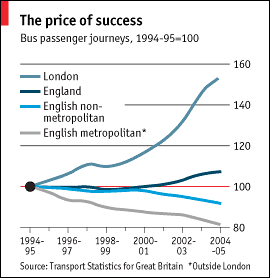A MAN who, beyond the age of 26, finds himself on a bus can count himself a failure. So Margaret Thatcher is reputed to have said in 1986, the year her government privatised and deregulated Britain's bus networks. Officially, at least, the Labour government disagrees with such sentiments: in 2000, it pledged to increase passenger numbers across Britain's bus networks by 12% by 2010.
A report published this week by the Passenger Transport Executive Group, an association of local transport officials, reveals the scale of the government's failure. Overall passenger numbers are up slightly, but that modest good news masks big falls both in the shires and the cities, where numbers have fallen by a tenth and a fifth over the past decade (see chart). Only in London have numbers risen, by over 50%. The capital's network carries 6m people every week on 700 different routes. That, says Transport for London (TfL), which runs the system, makes it one of the world's biggest.
Part of this success is down to the fact that London is a big, congested city. Gridlock on the capital's roads makes car travel unattractive. The Tube is one alternative, but many lines are stuffed to capacity. Relief will not come for several years, and there are large bits of the city that the network does not serve. For many commuters, buses are the only alternative.
But congestion is common in other cities, too. A more important reason for London's exceptionalism is that, unlike in the rest of the country, services in the capital were never deregulated. That means TfL can specify every detail of a particular routelength, frequency, fares and even the colour of the buses. Private firms then bid to run these routes, many of which are only profitable thanks to public subsidy.
Outside London, companies can set up and run any routes they like. Local authorities can fill gaps in the private networks, but only if they decide, on rather nebulous social grounds, that the service is inadequate. That causes problems, says John Dodgson, the report's author. In pursuit of more passengers, private firms may refuse to offer tickets that work on other forms of transport, or to co-ordinate their services with, say, the railways.
In the capital, by contrast, Ken Livingstone has great power over transport. His flagship congestion-charging scheme, introduced in 2003, makes driving in London's crowded centre even less attractive. It prods drivers onto buses and makes space for them on the roads. Mr Livingstone has made expanding London's bus network a priority, and has backed that pledge with taxpayers' cash. London's buses received £783m of public money in 2004-05, almost a threefold increase since 2000-01. Passenger numbers during that period have surged. Fares in London are roughly the same in real terms as ten years ago: in other big cities they have risen by an average of 86%, while the cost of motoring has hardly changed.
All that suggests that if the government is serious about getting more people onto buses, it needs to give local authorities control over routes, and to fund them generously. On the first point, Tony Travers, a transport expert at the London School of Economics, is cautiously optimistic. Two big reviews due later this yearone into transport, the other into local government financemay point in that direction, he believes. The funding question is tougher. Ministers are already embarrassed about the vast amounts of public money consumed by the newly popular railways. A similarly big cheque for the bus industry would be a hard sell.

